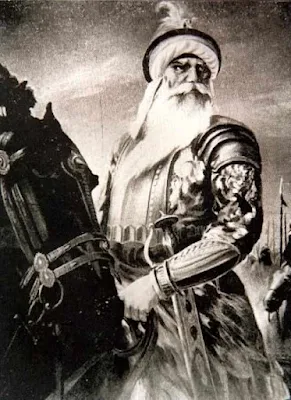Nawab Kapur Singh Virk (1697-1753)
Nawab Kapur Singh Virk (1697-1753) is considered one of the most revered, pivotal and legendary figures in Sikh history post 1716. Under his leadership decisions and courage, the then tiny Sikh community went through some of the darkest periods of its history.
The founding father of the Sikh Confederacy and Sikh Empire, he was also the founder of the Dal Khalsa. Alongside Banda Bahadur who dominated the seen before him, he laid the foundations of the Sikh Empire and the eventual over-through of the vicious Mughal Empire. Today, he is regarded by Sikhs to be of equal importance to Banda Singh Bahadur.
The period, starting from the massacre (in 1716) in Delhi of Banda, his son, seven hundred of his devoted army members and thousands of Sikhs taken captive or beheaded along the march to Delhi, was followed by severe action against the Sikhs by the rulers, including massacres of young men, women and children. However, every fresh adversity only stimulated the Sikhs' will to survive; after Banda, this fight against the oppressors was planned and led by Nawab Kapur Singh.
Many Sikh scholars have stated that had it not been for the leadership of Kapur Singh, the tiny Sikh community of the time would not have survived and would have been completely decimated. Today, significant number of Sikhs commemorate and celebrate his birthday as a sign of respect and as a way to repay a debt of gratitude for his sacrifice.
Nawab Kapur Singh Virk (1697-1753) is considered one of the most revered, pivotal and legendary figures in Sikh history post 1716. Under his leadership decisions and courage, the then tiny Sikh community went through some of the darkest periods of its history.
The founding father of the Sikh Confederacy and Sikh Empire, he was also the founder of the Dal Khalsa. Alongside Banda Bahadur who dominated the seen before him, he laid the foundations of the Sikh Empire and the eventual over-through of the vicious Mughal Empire. Today, he is regarded by Sikhs to be of equal importance to Banda Singh Bahadur.
The period, starting from the massacre (in 1716) in Delhi of Banda, his son, seven hundred of his devoted army members and thousands of Sikhs taken captive or beheaded along the march to Delhi, was followed by severe action against the Sikhs by the rulers, including massacres of young men, women and children. However, every fresh adversity only stimulated the Sikhs' will to survive; after Banda, this fight against the oppressors was planned and led by Nawab Kapur Singh.
Many Sikh scholars have stated that had it not been for the leadership of Kapur Singh, the tiny Sikh community of the time would not have survived and would have been completely decimated. Today, significant number of Sikhs commemorate and celebrate his birthday as a sign of respect and as a way to repay a debt of gratitude for his sacrifice.
